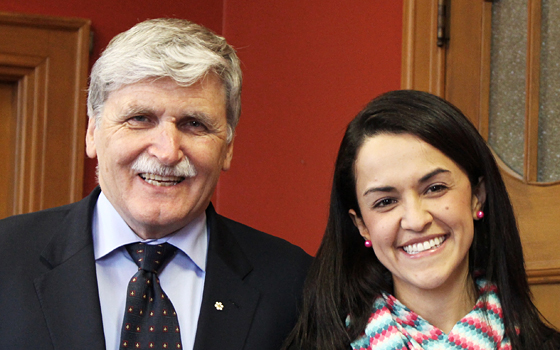Viviana Montoya and Emily Zinck share a common passion: to see a world where children are no longer used as pawns in adult armed conflicts. It is this passion, and an interest in researching possible solutions, that has won them each a Romeo Dallaire Child Soldier Scholarship.
The scholarships are presented by Dalhousie's Romeo Dallaire Child Soldiers Initiative to students who either were affected by armed conflict and who wish to study at Dalhousie, or students who want to research topics related to children in armed conflict. Montoya, a master's student in International Development Studies, and Zinck, a student in the Interdisciplinary PhD program, are the first-ever recipients of the award, which amounts to $5,000 renewable for up two years.

Viviana Montoya with General Dallaire. (Romeo Dallaire Child Soldiers Initiative Photo)
Montoya’s home country of Colombia is particularly affected by this issue. Watchlist On Children and Armed Conflict estimates that there may be as many as 14,000 children in Colombia serving as soldiers associated with various guerrilla groups, paramilitary groups and drug cartels. A vast number of child soldiers are female, so Motoya's research will examine specifically how Colombia might successfully reintegrate girl soldiers into society.
Montoya says that this particular moment in Colombian history, with the initiation of peace talks between the government and the Revolutionary Armed Forces of Colombia, has made her research particularly relevant. "I began to think that maybe Colombia is closer to a post-conflict situation," she explains. So as she researched the topic of post-conflict areas, she came to the realization that child soldiers are an enormous issue in Colombia, but that many people were not aware of the magnitude of the problem. "Doing research... could be part of the solution," she says.
Finding a future in research
Zinck first acquired her passion for this topic while doing a master's degree in International Health at Queen Margaret University in Scotland, where she studied the benefits of peace education on the well-being of children in post-conflict zones. This led to her present work, which will use participatory research to perform an evaluation of a rehabilitation program for children in a post-conflict area of Sierra Leone. Her research will also make the case for why participatory research with children, as a methodology, can be used effectively in such situations. "It's just something I've always been fascinated by,” she says. “I'm just fascinated by what it takes in a program or service to make a difference."
Both Montoya and Zinck see their futures in research. Montoya would like to continue looking into post-conflict situations in her home country, feeling strongly that academia has a role to play in moving the peace process forward. "I feel that now people in Colombia are open to [knowing] what's happening now. The moment we are in, it's an important moment in history. The government is starting to tell people [that] if we want peace we need reconciliation, we need dialogue. I think that's part of the process."
Zinck also hopes to continue doing research that bridges the gap between academia and community needs, noting that empowering children in post-conflict situations to be agents of positive change can be an essential step in rebuilding a damaged community.
"I don't do research for the sake of doing research, as much as I enjoy it. My research is an extension of my convictions and my desire to see change," says Zinck. "Obviously I don't believe my dissertation will solve all the problems, but it's part of the solution, and this is a part I can play."
Learn more about the .

